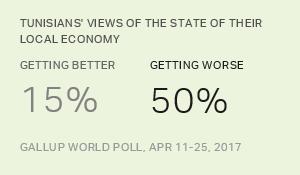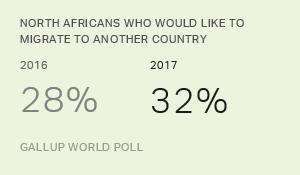Story Highlights
- Outlook for local economies worst in eight years
- 35% say living standards getting worse
- 25% of Tunisians express confidence in the country's national government
WASHINGTON, D.C. -- Tunisians head to the polls on May 6 to vote in the country's first municipal elections since President Zine El Abidine Ben Ali was removed in 2011. Prior to the elections in 2017, Tunisians' assessments of economic conditions in the country reached record lows in Gallup's World Poll trends. Poor economic conditions have sapped the public's confidence in the national government -- and municipal leaders may also shoulder some of the blame on Election Day.
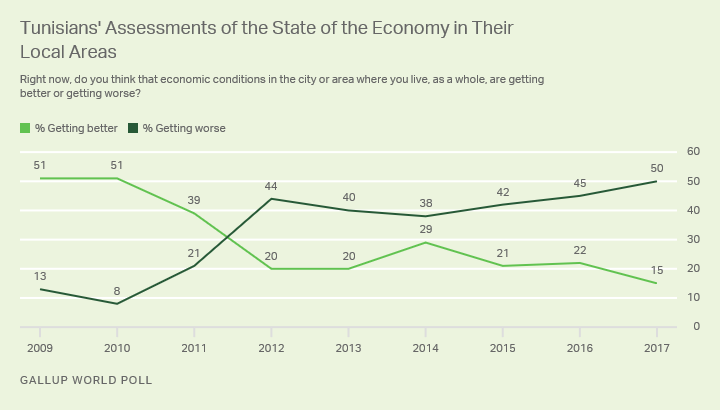
Tunisians' perceptions of the current state of their local economy in 2017 hit a record low for Gallup's eight-year trend, with 15% saying it was getting better and half (50%) saying it was getting worse.
There were substantial drops in optimism about the future economic conditions of Tunisians' local areas among both the top and bottom 20% of income levels from 2016 to 2017, suggesting an increase in economic pessimism among all levels of society.
Economic Decline Reflected in Assessments of Standard of Living
Tunisians' evaluation of their current standard of living largely reflects the growing economic malaise. Assessments of current standards of living fluctuated from 2009 to 2015, when worries about security receded and the economy became the primary issue for Tunisians. Since 2015, Tunisians' assessment of their standards of living has declined from 61% to the lowest point in Gallup's trend, 47%, in 2017.
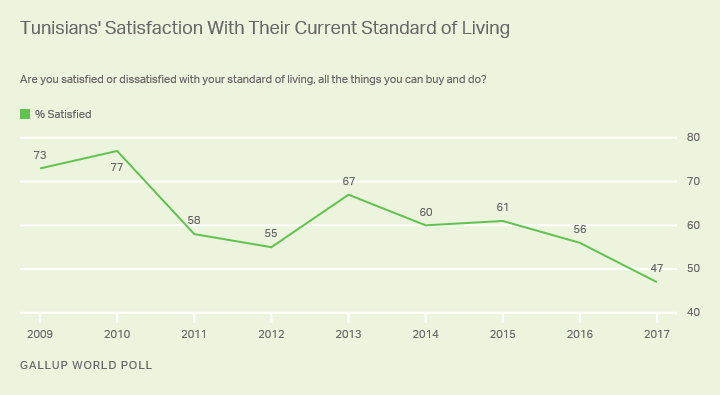
Tunisians are also pessimistic about the future of their standards of living, with a record low 23% of the country saying these were improving and record high 35% saying they were getting worse in 2017.
Lack of Economic Progress Saps Tunisians' Confidence in Government
Following Ben Ali's forced resignation in 2011, Tunisia experienced a period of unrest. During this time, Tunisians' confidence in their national government fell from 47% in the aftermath of the former president's departure in 2011 to 32% in 2013.
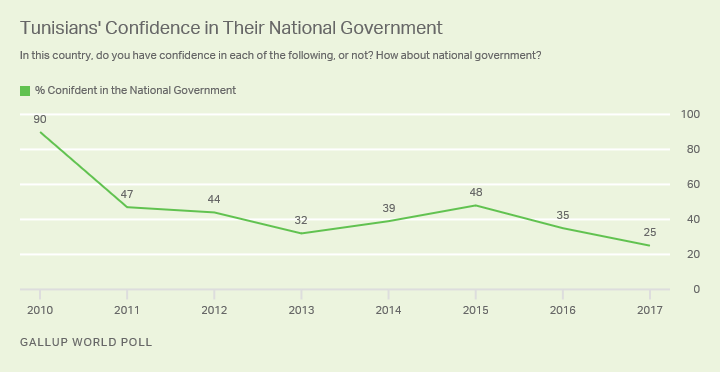
The 2014 Tunisian national elections brought the Nidaa Tounes political party to power and resulted in improved public sentiment, with nearly half of Tunisians (48%) saying they had confidence in the government in 2015. Nidaa Tounes was able to improve the security situation in the country, though rather than improve confidence in the government, Tunisians' discontent shifted from security to economic concerns.
While Nidaa Tounes attempted to improve the Tunisian economy by securing additional loans from the IMF and agreeing to develop a five-year plan to cut unemployment, there was apparently little improvement -- confidence in the government fell to 25% in 2017. As part of the IMF loan, the Tunisian government agreed to implement the austerity agreement and tax increases. This sparked a series of protests around the country, supported by Tunisia's main opposition party, the Popular Front.
Implications
Tunisians had been optimistic that Nidaa Tounes would improve the country's economy. However, that optimism has faded, as both economic measures and confidence in the national government have decreased. The imposition of the new austerity and tax law pushed Tunisians from dissatisfaction with their government and economy to protests and unrest.
The Tunisian government under Nidaa Tounes has acknowledged that economic development has lagged behind. However, this acknowledgement has not bolstered Tunisians' confidence in the government. Nidaa Tounes is running candidates in the upcoming municipal elections and it is possible Tunisian's lack of confidence in the national government may be expressed in opposition to the party's candidates at the local level.
Mathilde Lugger and Jihad Fakhreddine contributed to this article.
Survey Methods
These results are based on face to face interviews with 1,001 adults, aged 15 and older, conducted in Tunisia April 11-25, 2017, in Arabic. For results based on the total sample of national adults, one can say with 95% confidence that the maximum margin of sampling error is ±3.4 percentage points. The margin of error reflects the influence of data weighting. In addition to sampling error, question wording and practical difficulties in conducting surveys can introduce error or bias into the findings of public opinion polls.
For complete methodology and specific survey dates, please review Gallup's Country Data Set details.
Learn more about how the Gallup World Poll works.
